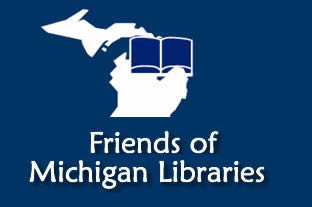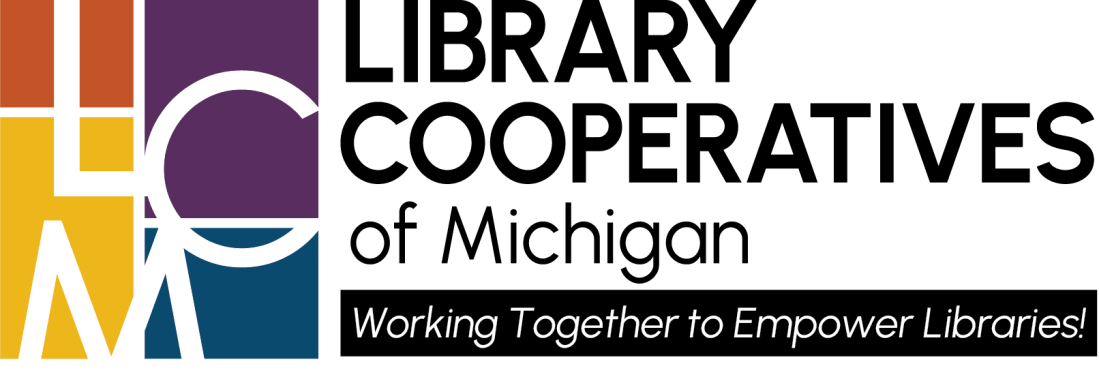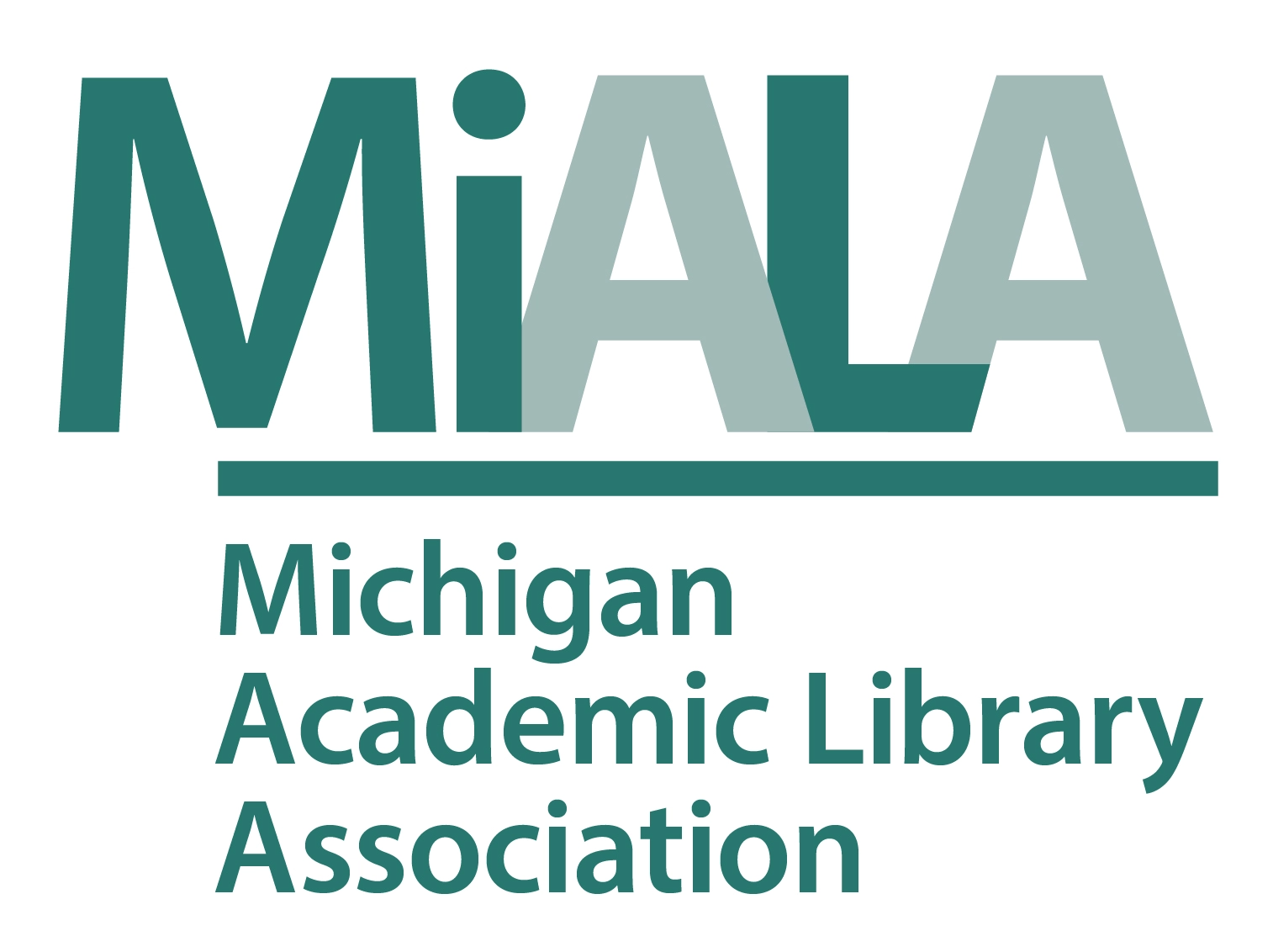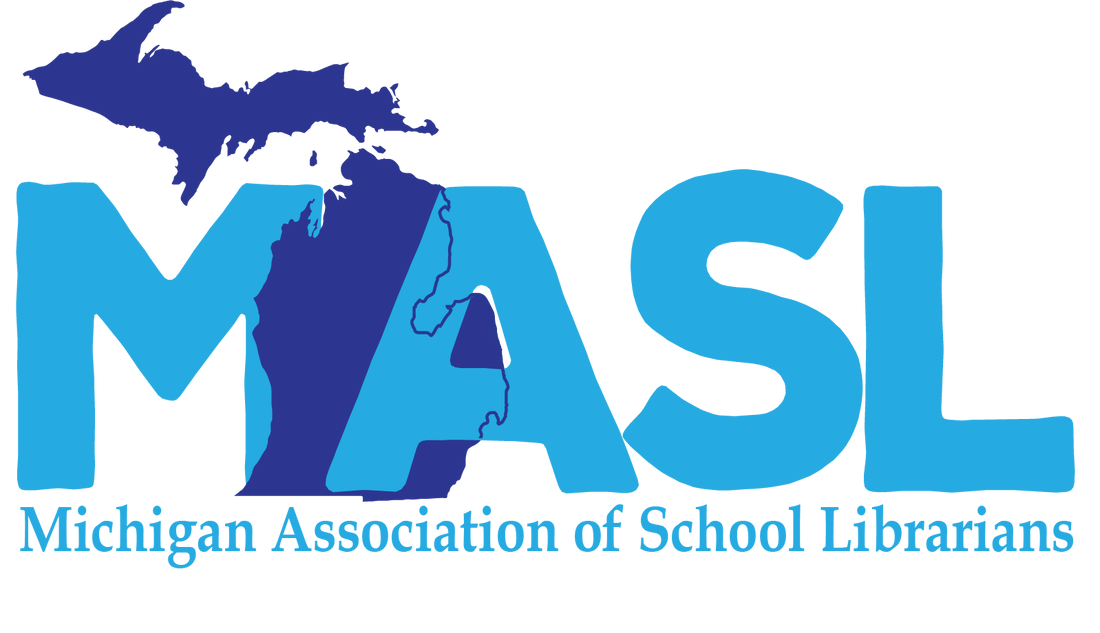- About
- Membership
- Education & Events
- Event Calendar
- Annual Conference
- Spring Institute for Youth Services
- Think Space
- Surviving and Thriving as a Public Library Director
- Leadership Academy
- Michigan Library Advocacy Day
- Youth Summit for the Right to Read
- Advocacy Hour
- MLA Connect
- MLA Connect On Demand
- Call for Proposals
- Vendor and Sponsor Opportunities
- Future Event Dates and Locations
- Programs & Services
- Advocacy
- News
- Job Board
 |
 |
 |
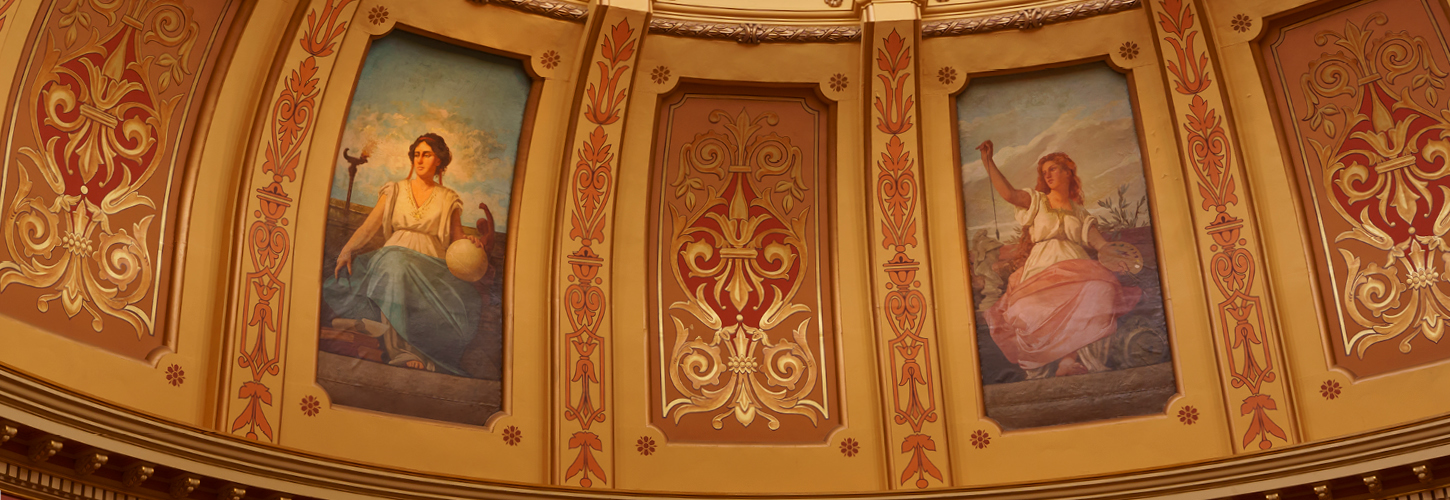
MLA Advocacy Action Plan | Priority Areas | Bill Tracker | Call To Action | Find Your Legislators | How to be a Good Advocate | Intellectual Freedom resources | Advocacy News Intellectual Freedom - MLA Advocacy Priority AreaThe Michigan Library Association actively advocates and educates in defense of intellectual freedom – the rights of library users to read, seek information, and speak freely as guaranteed by the First Amendment. Intellectual freedom is a core value of the library profession and a basic right in our democratic society. MLA opposes censorship of materials and is a proponent of the accessibility to materials without prejudice to every member of the community. As the digital world continues to evolve, libraries help ensure that people can access the information they need – regardless of age, education, gender, religion, sexual orientation, ethnicity, language, income, physical limitations or geographic barriers. Statement of Principle – Intellectual Freedom*Adopted by the MLA Board of Directors on September 10, 2021 - View as a PDF
Intellectual freedom encompasses the freedom to hold, receive and disseminate ideas without restriction. Viewed as an integral component of a democratic society, intellectual freedom protects an individual's right to access, explore, consider, and express ideas and information as the basis for a self-governing, well-informed citizenry. Intellectual freedom comprises the bedrock for freedoms of expression, speech, and the press and relates to freedoms of information and the right to privacy. The United Nations upholds intellectual freedom as a basic human right through Article 19 of the Universal Declaration of Human Rights which asserts: “Everyone has the right to freedom of opinion and expression; this right includes freedom to hold opinions without interference and to seek, receive and impart information and ideas through any media and regardless of frontiers.” Intellectual freedom encompasses many areas including issues of academic freedom, Internet filtering, and censorship. MLA values an individual's right to choose informational concepts and media to formulate thought and opinion without repercussion, restrictions to access and barriers to the privacy of information constitute intellectual freedom issues. MLA opposes any restrictions to access which may include:
In addition, MLA supports upholding an individual’s right to privacy of information. Some of these challenges include:
Not only does MLA oppose censorship of materials, but we are also proponents of the accessibility to materials without prejudice to every member of the community. As the digital world continues to evolve, libraries help ensure that people can access the information they need – regardless of age, education, gender, religion, sexual orientation, ethnicity, language, income, physical limitations or geographic barriers. * This statement of principle on Intellectual Freedom is attributed in whole to an array of articles and sessions documented through the all-encompassing work done by the American Library Association (ALA). Statement of Principle – Age Appropriateness and Placement of Materials in Public LibrariesAdopted by the MLA Board of Directors on September 13, 2024 - View as a PDF Since 2021, the Michigan Library Association (MLA) has been addressing an unprecedented volume of formal and informal actions to ban, hide, destroy, weed, move and challenge books in our libraries – which ultimately leads to restrictions on access to information. We believe in protecting Michigan citizens’ First Amendment rights and long-established case law that bars public libraries from censorship. MLA affirms that public libraries have a vital role in introducing young readers to a wide range of perspectives and information. Libraries are tasked with curating collections that are both diverse and balanced, reflecting various viewpoints to enrich the reading experience for all ages. To achieve this, public libraries rely on authors, publishers and professional book reviewers to guide the designation and classification of age appropriateness for all materials and to place these materials in the appropriate section of their library. Materials are normally categorized by Adult, YA/teens, children, graphic novels, and movies to name a few. Age ranges suggested by reviewers are based on multiple factors, including the age of characters, the complexity of writing, and developmental stages. These ranges are intended as general guides rather than strict rules, serving as starting points within the context of the work for determining suitability rather than definitive measures. A core responsibility of libraries is to provide age-appropriate materials, a task that requires careful consideration due to the subjective nature of what is deemed suitable. MLA emphasizes the importance of transparency in this process. Libraries use guidelines to determine appropriate age ranges for their materials and make these guidelines publicly available to foster trust and understanding among patrons. These guidelines are periodically reviewed and updated to ensure they meet the dual mission of oIering broad access while supporting responsible content curation. Each public library in Michigan develops its own collection development policies, which are approved by governing or advisory boards composed of community representatives. These policies outline the criteria for selecting, deselecting, and organizing materials. Librarians adhere to these policies, utilizing professional assessments, reviews, and community feedback to guide their decisions. Libraries of various sizes are sometimes constrained by budgets and availability of materials when building their collections. While libraries provide information to assist in age-appropriate recommendations, the ultimate responsibility for determining suitable content for children rests with parents and guardians. Parent and guardians are encouraged to use these guidelines as tools for making informed decisions, while respecting the autonomy of others in their community. As governmental institutions, public libraries do not have the legal right to act in place of the parent and make decisions about what materials children cannot access. In summary, MLA is committed to supporting public libraries in Michigan by promoting access to diverse and balanced materials shelved in the age-appropriate place in the library. We oppose restricting access to library materials based on age or grade level as this does not support individual needs, interests, and abilities of patrons. Ultimately, parents and guardians retain the right to choose what is age and/or developmentally appropriate for their own children, and libraries are willing and prepared to help every family find materials that meet their needs. We believe that while a specific book may not be the right fit for one person, it may still be the perfect fit for another. No one individual or group should make sweeping decisions that take that process of careful consideration and choice away from readers. Statement of Principle – Book Rating Systems and Labelling in Public LibrariesAdopted by the MLA Board of Directors on September 13, 2024 - View as a PDF Libraries are vital repositories of diverse viewpoints, ensuring that a broad spectrum of ideas are accessible to all. The inclusion of titles in the collection does not equal endorsement by the library. Rating systems and labels, created by individuals or organizations to guide users about the suitability of materials, pose significant challenges to the principles of intellectual freedom that libraries uphold. The Michigan Library Association (MLA) endorses library policies with objective finding aids, which help users locate materials by subject or genre, describing the content in the context of the whole work. We oppose the use of rating systems that endanger intellectual freedom by the endorsement of specific perspectives that infringe on informed choice. Example: The underlying assumption of rating systems is that certain individuals or groups can determine what is appropriate or inappropriate for others, and that users require guidance in selecting materials. Public libraries can’t legally use rating systems to justify restricting access or determining the appropriateness of content in any given materials – this would be considered an infringement of First Amendment rights. Many have suggested instituting a rating system like the Motion Picture Association (MPA) rating system (G, PG, PG-13, R, NC-17, non-rated). To be clear, the MPA rating system is a voluntary system that is not enforced by law; films can be exhibited without a rating and are subjective suggestions and have been criticized as having inconsistent standards. The MPA rating is, and has been intended only as, a guide and never as a legal mandate. Implementing an aged-based ratings system can imply that the library endorses or favors particular viewpoints, values, or beliefs, potentially restricting access based on subjective judgments about what is deemed appropriate for various audiences. This approach can stigmatize works that represent diverse perspectives or experiences, suggesting that some viewpoints are less valuable or acceptable than others as well as be a costly burden on tax dollars. Libraries should not adopt, enforce, or endorse rating systems, as these systems often serve as tools of censorship. Ratings reflect the subjective opinions of reviewers who may have moral, political or religious agendas. Professional librarians or educators are trained to assess materials based on diverse educational needs, interests, and experiences. Public libraries rely on authors, publishers and professional book reviewers, as well as their education and training, to guide the designation and classification of age appropriateness for all materials and to place these materials in the appropriate section of their library. Materials are normally categorized by Adult, YA/teens, children, graphic novels, and movies to name a few. In conclusion, libraries should resist adopting or endorsing rating systems and labels that could undermine their commitment to providing unrestricted access to diverse viewpoints. Libraries should focus on maintaining a neutral stance, allowing individuals to make their own informed choices. |

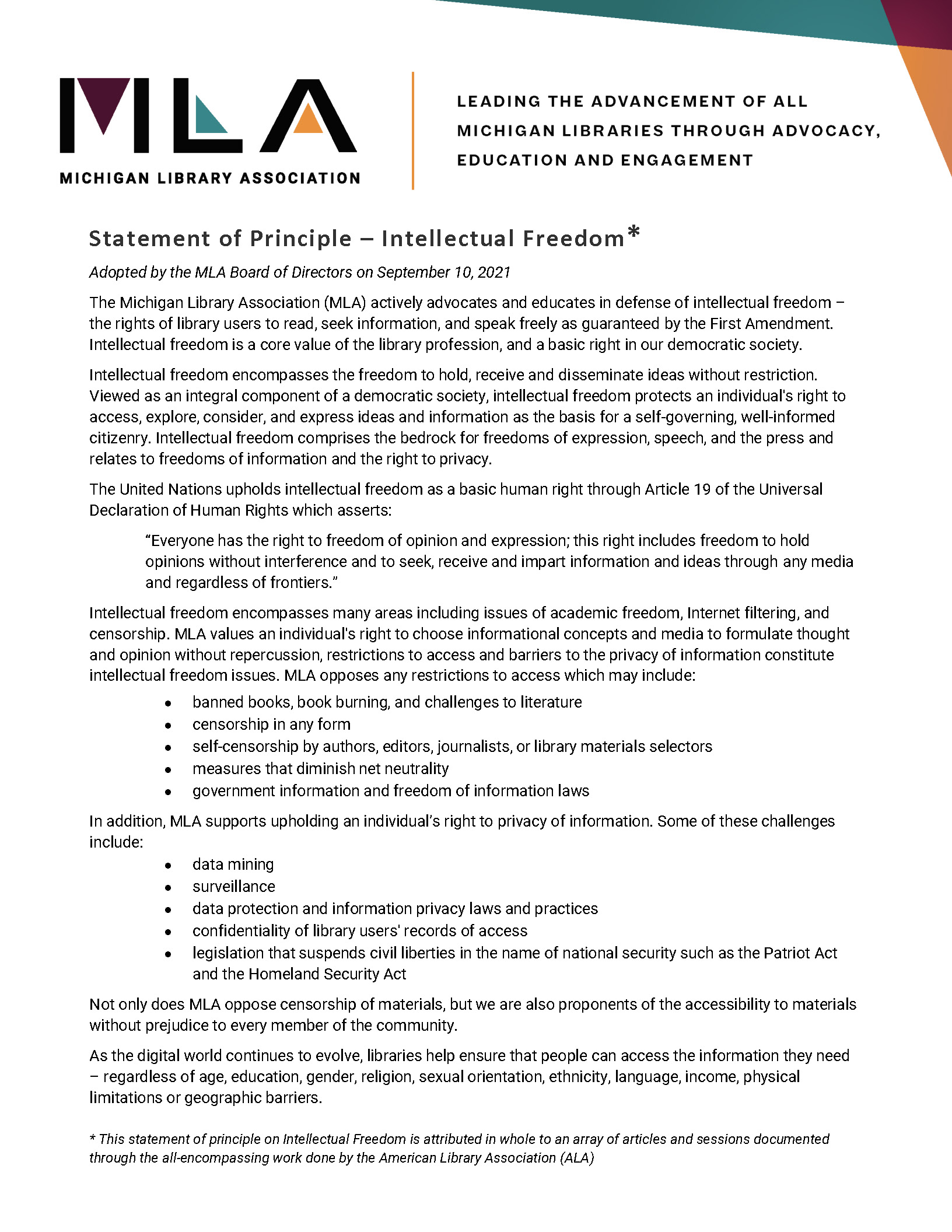 The Michigan Library Association (MLA) actively advocates and educates in defense of intellectual freedom – the rights of library users to read, seek information, and speak freely as guaranteed by the First Amendment. Intellectual freedom is a core value of the library profession, and a basic right in our democratic society.
The Michigan Library Association (MLA) actively advocates and educates in defense of intellectual freedom – the rights of library users to read, seek information, and speak freely as guaranteed by the First Amendment. Intellectual freedom is a core value of the library profession, and a basic right in our democratic society.
